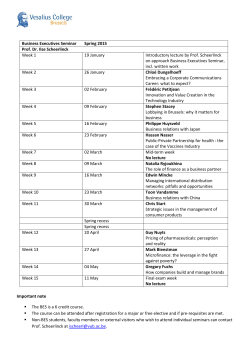
Assist. Prof. Dr. Gizem AKINCI University
University-Industry Relations and Entrepreneurship Assist. Prof. Gizem AKINCI Prof. Dr. Zafer UTLU • Value generation has been shifting from physical and tangible issues to intangible assets. • Management of learning and knowledge production processes is being complex than ever. Technology; Past It was accepted as a commodity, Now it is seen as a socio-economic process depending on its knowledge content and effects. According to the recent approaches, in which technology and knowledge are being considered as the same frame, knowledge is regarded as the outcome of research and innovation process, which requires complexity and high cost of learning from each others’ systems. New modes ; of knowledge production and knowledge application are different from former approaches and they begin with generic problem definition, continue with problem solving and end if the society is satisfied from the results. • In contrast to the old and traditional linear system, • recent non-linear or evolutionary knowledge production mechanisms depend on large networking, • transdisciplinary approaches and interaction with societal expectations. All beneficiaries • firms, • public authorities, • universities, • R&D suppliers, • society representatives, • finance organizations etc. - are involved and take part in these large networks. Some models are trying to explain the changes in the research system with its social and technical context. Most popular models are; 1. The model of National Systems of Innovation 2. The model of an emerging “Mode2” of the production of scientific knowledge and, 3. Triple Helix model of university- industry-government relations While collaborations between universities and industries have existed for a long time, this relationship has become more critical and important than ever in those recent systems. • All countries adapt distinctive strategies for their long term national strategic plans and technoeconomic policies, and operate their National Innovation Systems, which also cover some technology transfer strategies. • Since, university-industry joint research is a kind of advanced technology transfer tool; this relationship is assumed to be as one of the critical issues in knowledge based economies as well. • The underdeveloped countries’, • technology transfer systems mostly depend on know-how transfer, license and equipment acquisition from abroad. • In these transfer mechanisms, the tacit knowledge can not be transferred and assimilated for further technology development, • and there is a strong and continuous dependence to the counterpart countries. • On the contrary, the developed countries, • national innovation systems depend on such technology transfer systems, • where R&D activities and university-industry collaboration forms are observed • and in that the technology is generated, transferred, disseminated and continuously developed • Based on this perspective, science and technology producing systems, knowledge production mechanisms and the relation between science and technology should be designed correctly. As a summary, effective university-industry linkages and cooperation mechanisms are vital for enhancing the national knowledge production capacity. University ındustry cooperation is important in terms of information turn into technology It is imparative for the cooperation for small businesses and businesses that have insufficient RD department. On the other hand, universities have the chance to turn their information into product and accessing the application area. Thank you very much your attention
© Copyright 2025











